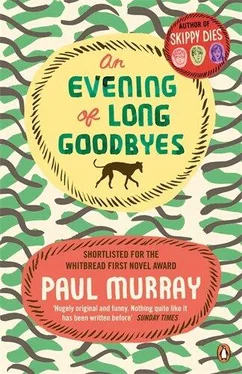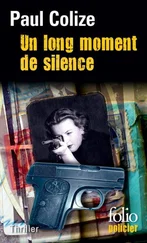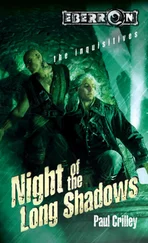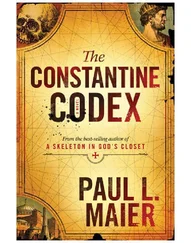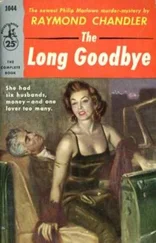Nevertheless, it was all I had left. I had not called Gemma at Sirius Recruitment. My experience at Mr Dough had soured for me the whole idea of working; or rather it had served to confirm what I suspected all along, namely that working for a living was a mug’s game. ‘The way I see it,’ I said to the others, ‘if you’re not rich, you’re poor, and the only way to get rich is either to be rich already, or take up some sort of a crime, like architectural salvage or robbing old ladies — no offence, I mean.’
‘Ah you’re all right, Charlie,’ Frank said.
‘Gnnhhhrhh,’ snored Droyd from his stupor on the sofa.
‘Or starting a recruitment company,’ I mused bitterly.
So, as outside the streets grew day by day chillier and darker, and the fateful dinner party floated before me like an uncontemplatable abyss, I whiled away my hours in my dressing gown in the armchair. I wrote a line of my play and scratched it out; I swamped myself in vast deluges of memory; I concocted plan after fantastical plan by which to force Bel to stay — including, but by no means limited to: skywriting a carefully worded apology in the area of sky adjacent to her bedroom window; feigning to have contracted a life-threatening illness; having my play finished, submitted and produced to great acclaim at the Abbey, starring Bel Hythloday, ideally before Wednesday; ringing up Mother and proving to her by exhaustive analysis of her recent behaviour that Bel was in no fit state to travel; actually contracting a life-threatening illness viz. Lassa Fever by concentrated association with Boyd Snooks. But most of the time I did what I did best, which was nothing.
I thought sporadically of returning to my monograph. I had reached the 1950s now: all the films were in that lurid Hollywood colour that made everything look at once gaudy and exhausted. Gene had stopped wearing make-up years ago, but the overripe tones saturated her too, accentuating the vacancy that grew at the heart of her performances. If she had been trying to hide herself in her earlier films, in those last four — Personal Affair, The Egyptian, Black Widow, The Left Hand of God — she was gone. Sleepwalking would be putting it kindly: everything about those performances pointed to a person who was no longer actually there — the inertia, the lifelessness of her movements, the opacity of the beautiful eyes.
The Left Hand of God would be her last starring role in a movie. As soon as the film was completed she fled Hollywood and holed up in New York with her mother. The studios promptly suspended her for breach of contract, and accused her publicly of prima donna tantrums. Reporters hounded her; the telephone rang day and night until finally her mother disconnected it.
In the New York apartment everything became confused. She slept for days on end. She didn’t recognize the faces of her friends. She had never been political before, but now became obsessed with Communist plots: she thought the Communists were trying to poison her, she thought they were replacing the words on the pages of the books she read. She stopped eating, then went on a diet of chocolate and bread and butter and gained twenty pounds in a couple of weeks because she thought she was pregnant and eating for two. Every night she imagined she gave birth, and every night the Communists stole her child; or she dreamed that Daria was no longer in an institution, but in the house of a couple living down the street. Her brother would find her in the middle of the night, banging on the neighbours’ door, demanding that they give her her daughter back. At last she was committed to the Harkness Pavilion asylum, New York.
Electro-convulsive therapy — ECT — was at that time considered a breakthrough in the treatment of the mentally ill. By administering an electric shock directly to the brain, it seemed that patients could be temporarily jolted out of their psychoses. The shock made them forget everything; and as Gene commented, you can hardly be depressed about what you don’t remember. She was given thirty-two of these treatments over a single year. Every time she woke up not knowing who or where or what she was. Gradually, some of her memories would come back; generally, childhood first, then adolescence, then the middle past. But the months and years preceding the treatment did not. They were simply gone — impersonally stripped away, as if they had never happened, so that years later, when she came to write her autobiography (entitled, self-deprecatingly Self-Portrait ), she had to rely on newspaper scrapbooks, letters, the testimony of friends.
Her life in the institution became one long grey anonymous blur, punctuated by the electric current. And in some ways it worked: she was pacified, docile; she knitted, made tables, scrubbed floors; she was happy to be relieved of the burden of her identity. But she remained in dread of the ECT sessions. She recounts one occasion, waking up in the usual state of utter limbo, and — although, of course, she did not know why — suddenly becoming so angry that she punched the nurse standing over her right in the jaw. In revenge, the nurse brought her to the ward where the hopeless cases were kept and left her there for the day. Gene herself was so far gone, however, that she mistook them for Method actors from the Stanislavsky school. She stood there and applauded, all day long.
It struck me that it might not be such a great shift, from Hollywood actress to mental patient. The hospital, like the studio, exercised strict controls on every aspect of your image, your routine, how you thought and spoke and acted; the patients were like actors who had stumbled too far into the script and could not find their way back out. Perhaps this was why Gene was released when she was: she knew how the system worked, she knew what they wanted from you: and she had what she called her model’s trick, the ability to change her look for whatever the scene demanded. Trader, outlaw, dust-bowl Salome, frontier girl, aristocrat, Arabian, Eurasian, Polynesian, Chinese — she knew how to remake herself to order; she could make it look, given time, as if nothing was wrong. And no one could tell, or at least no one troubled to look at what was still transpiring beneath the lovely exterior.
But I could tell; and perhaps that was why, as the days tightened around us like a noose, the garishness and the threadbare plots of those late films seemed curiously to fit my wintering world of curtailed greys and blacks; her sleepwalking performances seemed, somehow, to strike a chord in me, and even to provide a sad strain of company.
The night Frank and Droyd had their set-to it started to rain and did not stop. It was as if the belly of the sky had been cut open: the water thrashed against the window with such vehemence that the outside world was obliterated. The walls of the flat shook and groaned in the wind, and at one point the entire building seemed to pitch forward, sending junk skating off the shelves to the floor.
I was sitting in my dressing gown, trying to watch the television. The reception kept going: every few seconds snow crunched up on to the screen like a nervous tic. Frank was in his bedroom with Laura, working on his bookshelves, which for all the banging they were making seemed to be progressing very slowly; although as Frank had no books anyway, I suppose there was no real hurry. There was a knock at the door, and Droyd appeared from somewhere to answer it. Three cadaverous young men were standing in the hall.
Droyd, I should point out at this juncture, was a changed man from the boorish lout who had first moved in. One hesitates, obviously, to blow one’s own trumpet, or put oneself forward as a civilizing influence, but whatever the reason, it seemed he was thoroughly reformed. He scarcely played his music at all now; he would sit by the window or in front of the television peaceful as a lamb. In fact, one could almost say he was too quiet for a lad his age. He seemed to have abandoned his musical career, and also appeared to sweat more than was customary. But this was to split hairs. All I knew was that he hadn’t called me a shirtlifter or tried to steal my wallet in weeks.
Читать дальше
